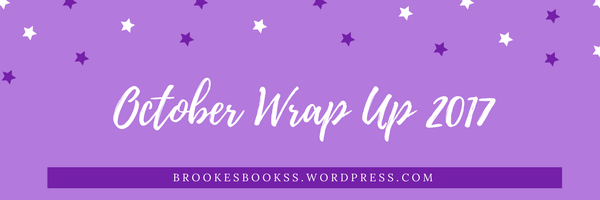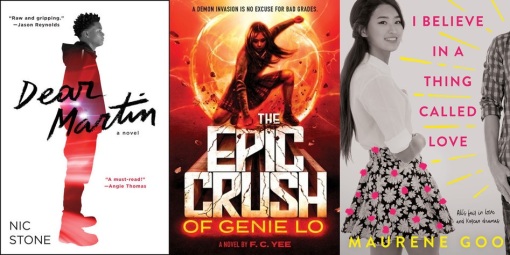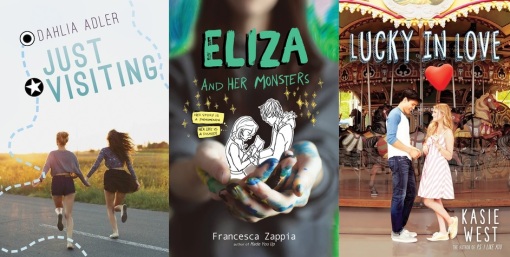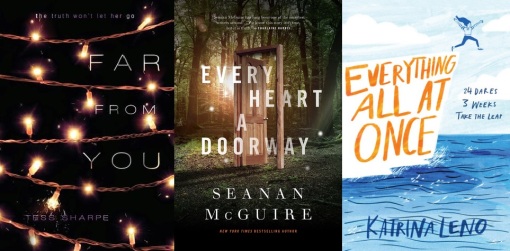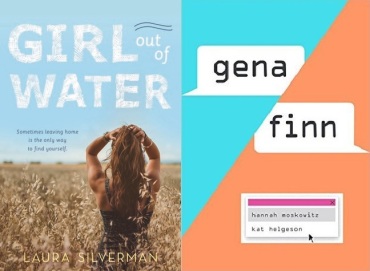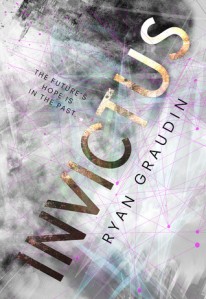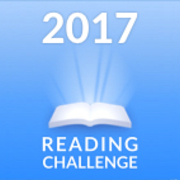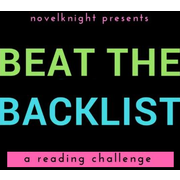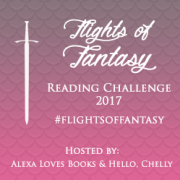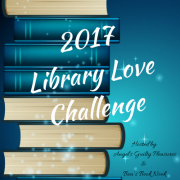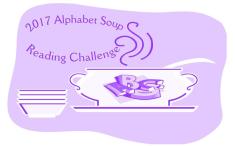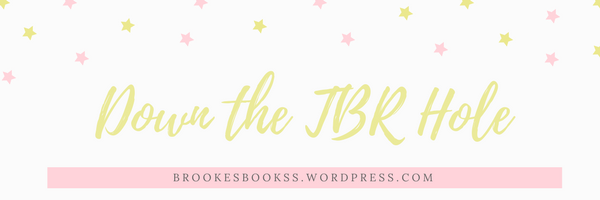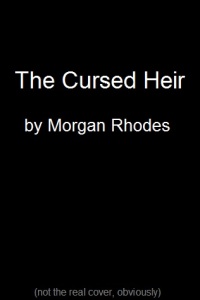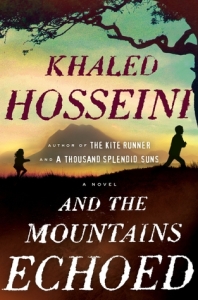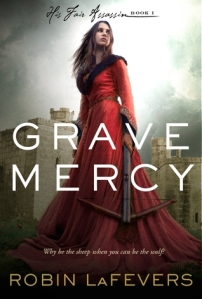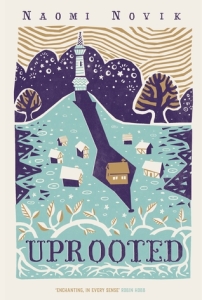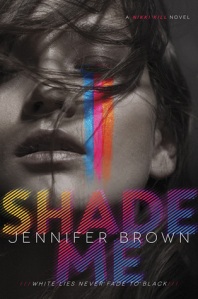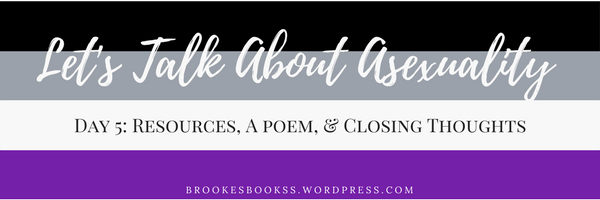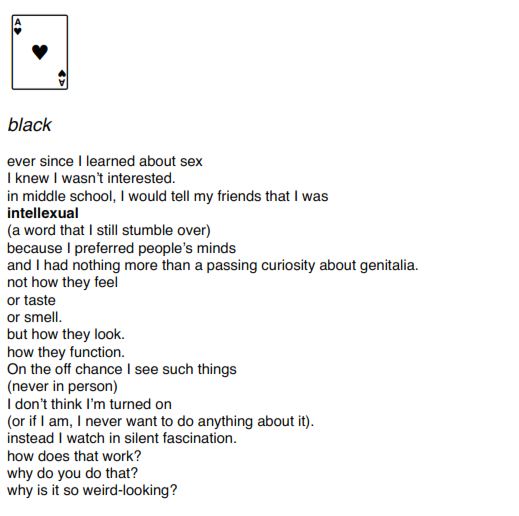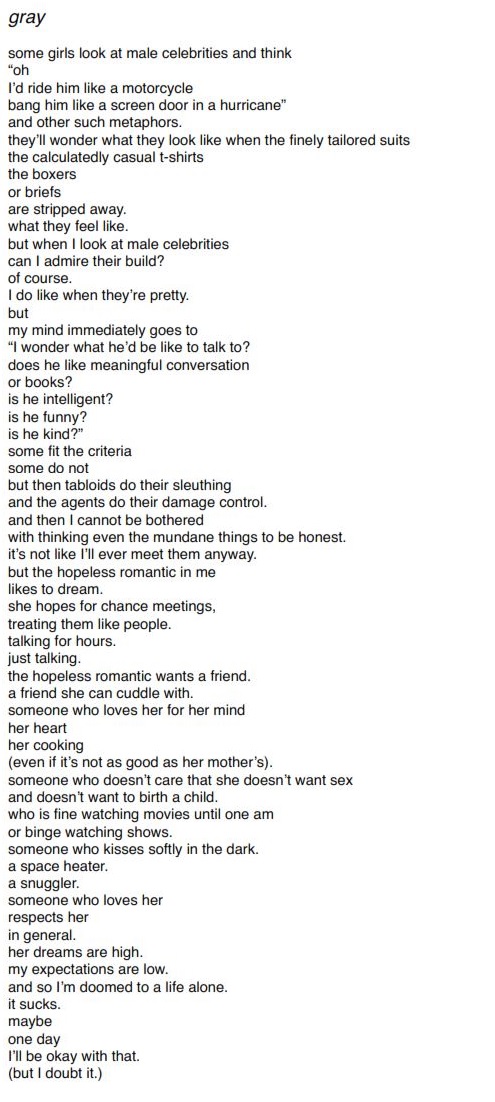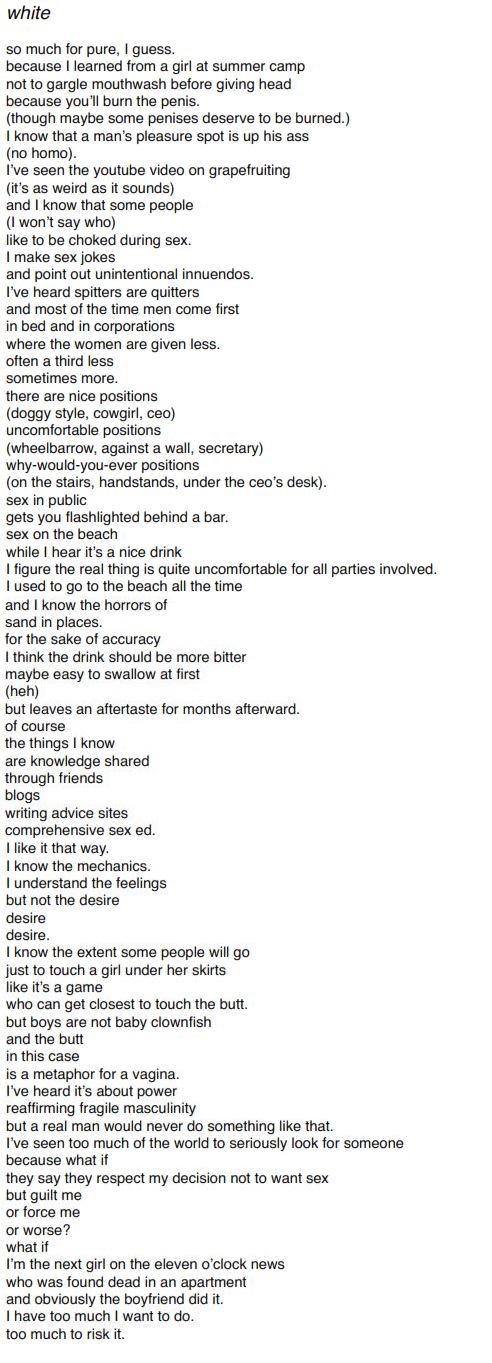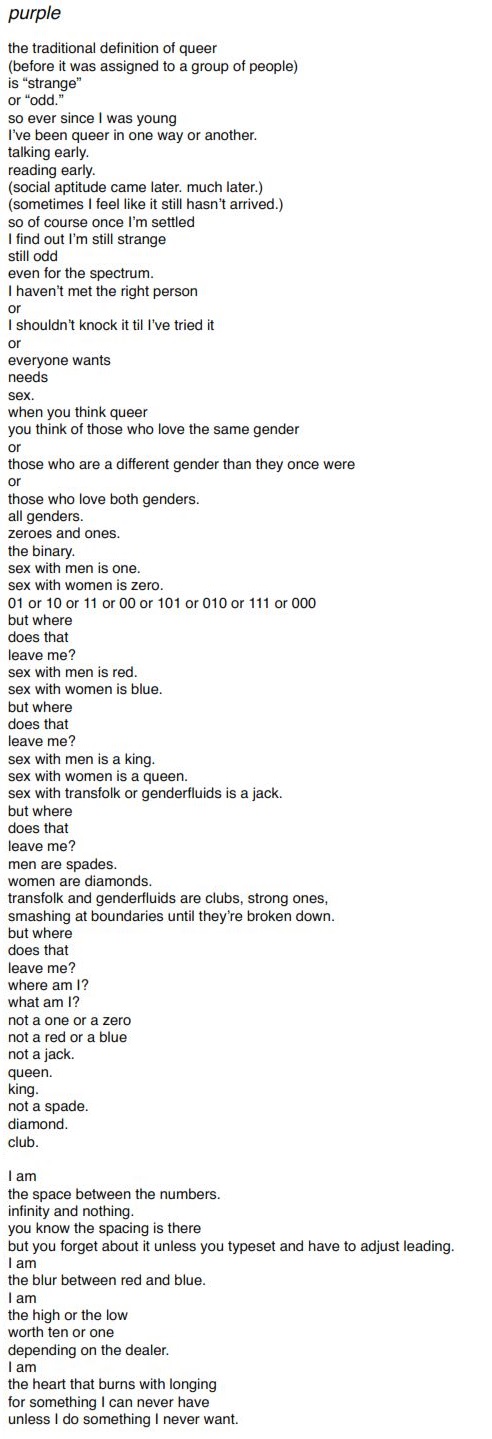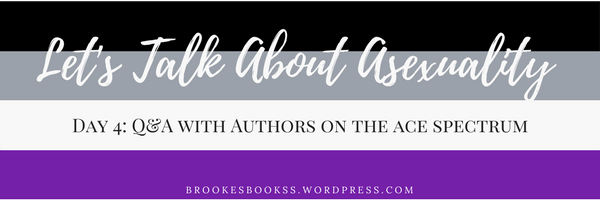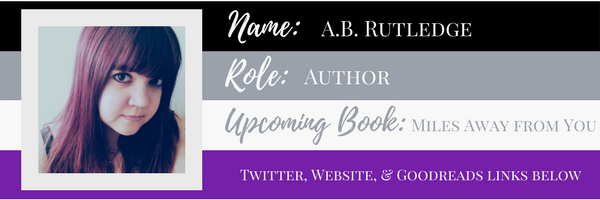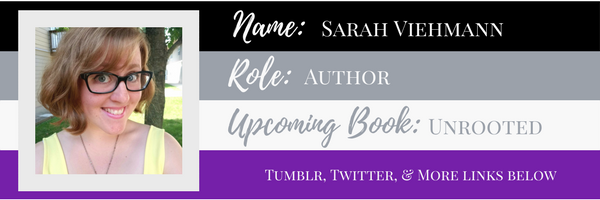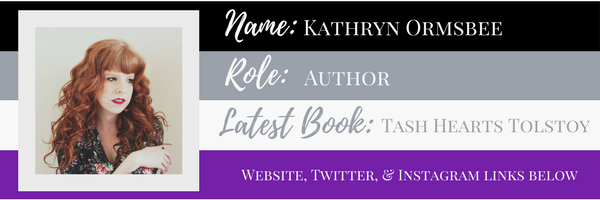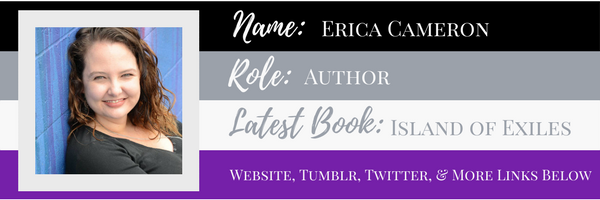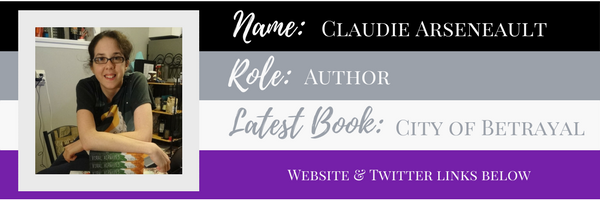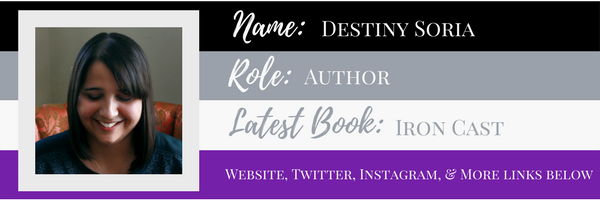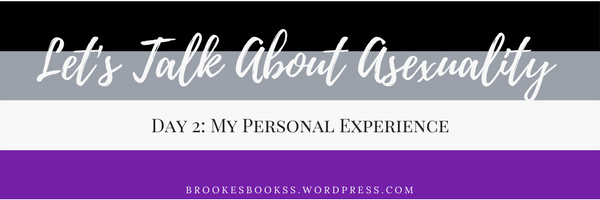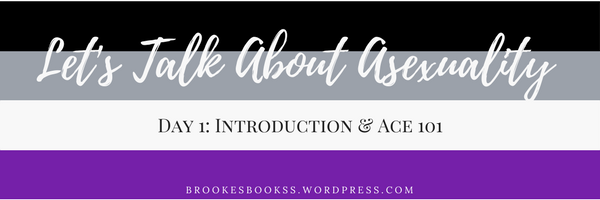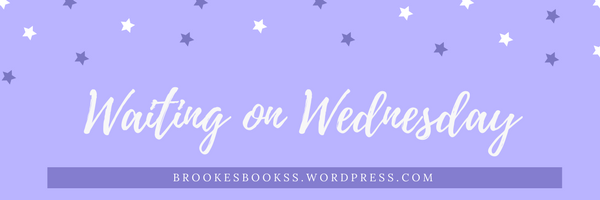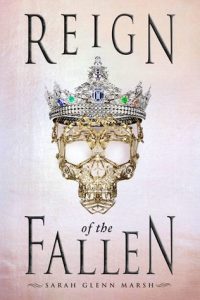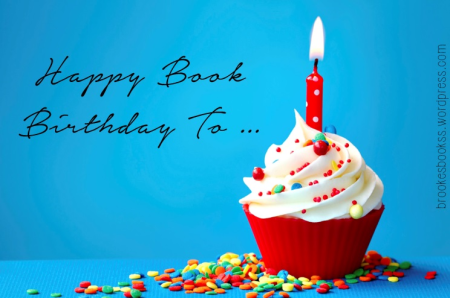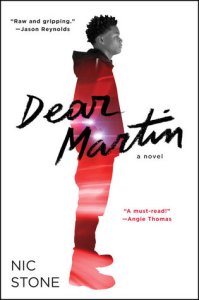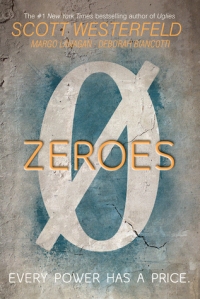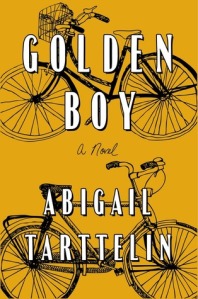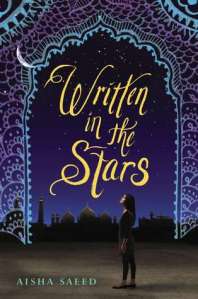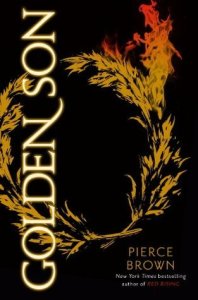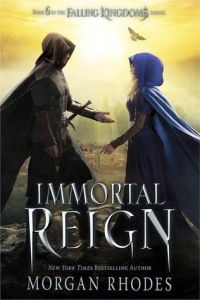
Hello everyone and welcome to Day 3 of Let’s Talk About Asexuality – my five day blog series about asexuality! If you missed the previous posts, click here for Day 1’s post and click here for Day 2’s post.
Today, I’m very excited to welcome 10 members of the book community that identify somewhere on the asexual spectrum! Since not every person experiences asexuality the same way, I thought it was important to include as many different ace-spec voices as possible.
The Guests:
Before we get into the question and answer portion of this post, let me introduce you to my guests. Don’t forget to support them by checking out their blogs, booktube channels, and other links!
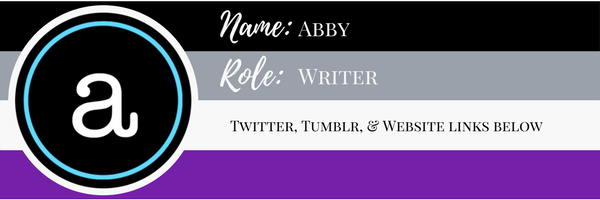
Abby’s Links: Twitter | Tumblr | Website
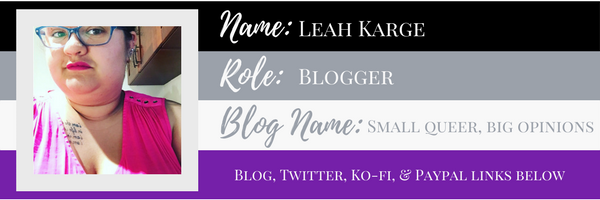
Leah’s Links: Blog | Twitter | Ko-fi | Paypal

Kav’s Links: Booktube | Twitter | Instagram

Shenwei’s Links: Blog | Twitter | Instagram
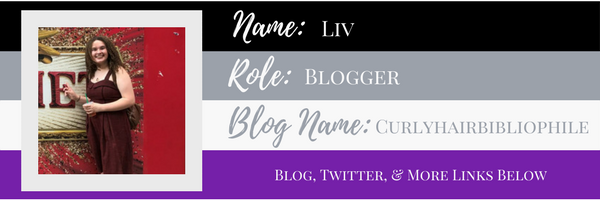
Liv’s Links: Main Blog | Second Blog | Twitter | Goodreads | Ko-fi

Jill’s Links: Blog | Instagram | Twitter | Tumblr

Kaeley’s Links: Blog | Twitter | Instagram
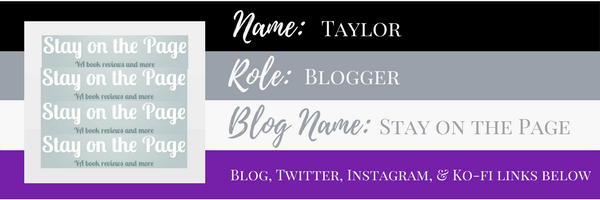
Taylor’s Links: Blog | Twitter | Instagram | Ko-fi
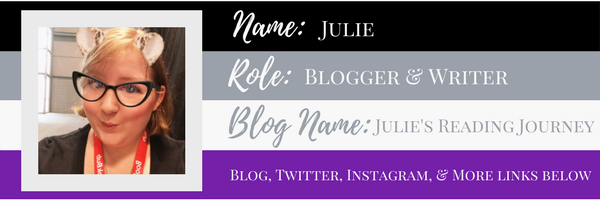
Julie’s Links: Blog | Twitter | Instagram | Patreon | Ko-fi | QuietYA | Blogbound Con | Pique Beyond | YA Interrobang

Mikayla’s Links: Blog | Twitter | Podcast | Ko-fi

1. Introduce yourself! Tell us a bit about yourself and how you’re involved in the book community.
Abby: Hi there. I’m Abby, and I’ve loved books my whole life. I’m an aspiring author and I’ve gotten more active in the book community on Twitter and tumblr in the past few years. I’ve tried my hand at book blogging/book reviewing, but I haven’t been able to keep up with it. College and now a full time job kind of messed that up. But I support all writers when and where I can.
Leah: Hi, my name is Leah and I use they/them pronouns! I run the blog Small Queer, Big Opinions, where I review books of all genres and age groups. Occasionally, I’ll put together recommendation lists or participate in blog memes. I’m also active on twitter at @nickyoflaherty! I love being able to interact with people from within the book community on there, whether it’s sharing recs, discussing rep, gushing about books we loved, and so much more. I’ve met some amazing friends there! Also, I am a beta reader and CP for a few different authors, some of whom I met through the twitter book community.
Kav: Hi! I’m Kav, a 16-year old booktuber and co-host of Prideathon who has been part of the book community for about a year and a half now. My channel primarily focuses on book hauls, tags, reviews, and diversity discussions. I’m also pretty active on both book twitter and bookstagram and I just generally love interacting with fellow book lovers.
Shenwei: Hi, my name is Shenwei (they/them pronouns) and I’m an avid reader of middle grade and young adults books. I blog at readingasiam.wordpress.com, using my degree in Asian American studies and background in queer communities of color to critically analyze issues of representation in fiction. I also post bookstagram pictures at Instagram.com/theshenners.
Liv: Hello there! My name is Liv, and I’m a 16 year old book blogger at curlyhairbibliophile.wordpress.com. I’m also a co-blogger at arcticbooks.wordpress.com. Besides books, I’m also involved in theatre both in and out of school. If you can’t tell, I love to stay busy.
Jill: Hiii I’m Jill! I’m 17 years old, I live in the United States, and I’ve been blogging for over 3 years now! I began on Instagram, and gradually began to spend more time on Twitter and make my own blog! (abooknerdreads.wordpress.com) These days I’m really for advocating diverse books across all platforms of blogging, I love getting the word out how important it is to promote diverse perspectives ❤
Kaeley: Hello all! I’m Kaeley from Spoilers May Apply. I also have an Instagram and a Twitter. I love to connect with fellow booklovers who want to discuss endlessly so hmu I’ll respond for sure!
Taylor: Hello! My name is Taylor Tracy and I am a blogger at Stay on the Page (stayonthepage.wordpress.com)! I also pair books with LUSH bath bombs every Friday which you can find on my Twitter (@tayberryjelly) and my Instagram @taysbathsandbooks. I am also a writer currently querying my YA contemporary novel.
Julie: I’m Julie and I have hands in a lot of YA pies! I started as a book blogger and things quickly spiraled out of control – I created #quietYA, co-founded Blogbound Con, write at YA Interrobang, write at Pique Beyond, work as a freelance editor and publicist, and I’m getting pretty into the bookstagram community…so basically books are my everything. I still blog for fun sometimes, I’m a little obsessed with my cats, and I’m a complete bullet journal convert.
Mikayla: I’m Mikayla. I’m currently working on my master’s degree in aerospace engineering. In my (extremely limited) free time I live-tweet reading speculative fiction books for ace and aro representation, and discuss how representation can be improved.
2. Where do you fall on the asexual spectrum?
Abby: Pretty sure I’m solid ace. I don’t know if I’m gray-a. I guess I’m ace until proven demi?
Leah: I identify as demisexual! Which, for me, and many others, means that I need to form some kind of close, emotional attachment to a person before I am attracted to them at all. So I tend to fall for my (best) friends.
Kav: I’m pretty much as ace as one can get. I identify as asexual and am not interested in sex at all.
Shenwei: I am gray ace/demisexual.
Liv: On the asexual spectrum, I identify closely with demisexual. Most of the time I use the umbrella term of ‘ace’ just because it’s easy to say for others.
Jill: As for the asexual spectrum, I fall right on asexual! I believe sexuality is fluid, so I say I’m ace, but in the future I could be demisexual, or even sexual, who knows!
Kaeley: I’m a biromantic grey ace.
Taylor: I am demibiromantic asexual, so I identify as aro-spec as well as ace-spec.
Julie: I’m demisexual and questionably-heteroromantic, maybe biromantic? Jury’s still out on that one.
Mikayla: I have never experienced sexual attraction.
3. How old were you when you discovered that you were this identity? How did you figure it out? Did you ever think you were a different identity in the past?
Abby: Well. When I was in middle school, I called myself an “intellexual,” because I didn’t understand the appeal of sex. Come high school, I still didn’t understand it. When I finally found a word for it, I realized I wasn’t a freak or broken. I was just ace. I mean, I guess I thought I was heterosexual because I was interested in guys and all people are supposed to want sex, right?
Leah: I was about 22 when I first started figuring it out—I’m 24 right now—but I was 23 when I finally realized that demi was the best fit for me. The idea that I might be ace spec first started percolating in my brain when I was reading a draft of 27 HOURS by Tristina Wright, which I’ve done several beta reads for, as there’s an asexual character—Braeden. I didn’t realize what was happening at first, but I just knew Braeden was one of my favorites from the very beginning. It still didn’t quite click in my head yet, until I did beta reading on PART & PARCEL for Abigail Roux and then did another read of 27 HOURS. Finally, it clicked in my head that maybe I felt these ace spec characters were personally relatable because I might be ace spec too. I’d been on tumblr for a few years at this point, so I knew of other resources where I could do research and figure myself out. Summer of 2016 is when I finally settled on demisexual, and as someone who loves having labels for their identity, it was an absolute relief to finally have a word for my feelings.
Kav: I can’t pinpoint exactly when I figured out my identity, but I do know it was during the end of my freshman year/beginning of my sophomore year of high school, so I was either 14 or 15. I never particularly identified as something different, when I was first introduced to LGBTQIAP+ community I identified as panromantic, but I never identified with a different sexual orientation.
Shenwei: It took me until I was about 22 or 23 to figure out my ace identity. I didn’t have the language and the awareness of asexuality as a teen, and for a long time I identified as straight (as well as cisgender).
Liv: I started identifying as demisexual around 14 years old. In fifth grade, I remember my friends all being boy-obsessed. I didn’t understand why they were obsessed with these guys so much; they all told me that it was impossible that I didn’t have a crush. In my head, I always just thought that I wasn’t ‘normal’. I started watching the youtuber Evan Edinger in early 9th grade. He made a video about his demisexuality and described almost exactly what I felt. I began to do my research about it, and that is how I came to identify as demisexual! 🙂
Jill: I was 16 when I discovered my identity from Twitter, where I found a wonderful community. I took a few quizzes (oops) and used Tumblr posts to determine my sexuality. When I found the term “aromantic asexual” everything just. . .clicked. I knew I was different my whole life, as I shrugged off crushes, flirting, dating—I didn’t have interest in it. Now I call myself aro/ace and I feel so happy.
Kaeley: I was 23. Basically I started seeing the word asexual on my timeline a lot, and I didn’t know what it was. So I looked it up and read about it and realized it was a good explanation for a lot of my behavior in the past. I didn’t have much interest in sex, but I loved holding hands and hugging and cuddling and dating and being in a relationship. I just thought I was hetero in the past.
Taylor: I figured out I was ace when I was 20. I had thought I was bisexual since I was 12, mostly because I was ignorant to the other possibilities that were out there. I knew there was gay, straight and bisexual, but I didn’t know about anything else. So I was unhappy with labeling myself as bi, but didn’t really feel like I had a choice. That all changed in June 2015 when I was at a book panel for a bunch of queer authors in New Jersey. One of them started talking about how her feelings had started changing when she was a teenager in terms of like finding them sexually attractive. I don’t know what it was, but a bell went off in my head. I remember looking around and feeling like everyone else was in on some joke that I was missing. I realized that I didn’t have those feelings and started to panic, thinking there was something wrong with me. I went home that night and googled “not wanting to have sex” which brought me to the Asexual Visibility & Education Network (AVEN). I scrolled around on their site for a bit and came to the conclusion, that yeah, this term “asexual,” it really fit me. I never turned back.
Julie: I knew vaguely about asexuality when I was in high school, but didn’t feel like that really fit me. I didn’t hear about demisexuality until I was 19 or 20 and reading that things just…clicked. The only crushes I had were guys I was friendly with and even then it was sort of a take it or leave it situation, but I wasn’t uninterested in sex. I’d thought I was just a weird straight person but demisexuality has always just felt right.
Mikayla: I figured out that being ace was a thing I could be when I was 19. I know I was insisting that I wasn’t interested as early at 10, but for the longest time I didn’t know there was a name for what I was, or that it was a thing I could be.
4. Do you identify as anything else LGBTQIA+ related? If yes, when did you discover those parts of your identity? Was it before or after you figured out your asexuality?
Abby: I’m heteroromantic-borderline-biromantic. But in reality, I’m a paranoid-romantic. As in, I want a romantic partner but I’m too afraid to actually pursue one/get involved in the off chance someone is interested. I figured that part out pretty recently actually.
Leah: Along with demisexual/demiromantic, I also identify as bisexual/biromantic and demigirl (they/them). I realized I’m bisexual when I was 19 (thank you, Rosario Dawson in RENT), and it was probably about a year or so ago (22 or 23?) when I realized that, for me, that means all-around attraction to women and enbies, and aesthetic attraction to men. For demigirl, it was earlier this year–April 2017 and 24 years old—that I realized demigirl fits best for my gender identity, though I’d been wondering for a while previously whether I was Cis or Not™.
Kav: Yes I do! I identify as biromantic and non-binary/gender-fluid as well. As I stated in the first question, I originally identified as panromantic, but earlier this year learned that I feel more comfortable with the biromantic label. So technically I identified as asexual first, but I knew I liked multiple genders romantically before that. I also identified as non-binary/gender-fluid before identifying as asexual. I figured out my gender during mid-freshman year, so it wasn’t too soon before figuring out my asexuality, but I did fall into my gender identity first.
Shenwei: I’m non-binary/genderqueer/genderfluid, bi/pan and demiromantic/gray aromantic. I first figured out that I was non-binary, and then rest came later. Exploring my gender definitely opened me up to exploring other aspects of myself.
Liv: No, I’m only hetero-romantic demisexual.
Jill: I also identify as aromantic, meaning I experience no romantic attraction in addition to no sexual attraction.
Kaeley: Nope. I always assumed I was hetero.
Taylor: I also still identify pretty strongly as bi, but instead of bisexual it’s now biromantic. I discovered that way earlier, beginning when I was around 12. I’m also demiromantic, which means I’m not romantically attracted to people until I have an emotional connection to them.
Julie: As I mentioned, I considered myself straight before I knew about demisexuality, and that’s still where I fall. For simplicity, sometimes I’ll just call myself ace and I do sometimes refer to myself as queer, but generally only when I’m trying to remind people that aces are queer, otherwise I don’t really feel personally comfortable with it yet.
Mikayla: I am aromantic, which I figured out at the same time I figured out I was asexual. I am also non-binary, which I just figured out this year.
5. What is the first book you read that you felt truly represented your asexuality? If you haven’t found this book yet, tell us about a book that had an ace-spec character and why you liked or disliked it.
Abby: Haven’t found it yet. But I am 98% sure Felicity from Mackenzi Lee’s GENTLEMAN’S GUIDE TO VICE AND VIRTUE is ace. And she’s an intellectual badass and snark master. You don’t need to be hypersexual to be awesome.
Leah: As I mentioned in a previous answer, the first books I read in which I felt represented were 27 HOURS by Tristina Wright and PART & PARCEL by Abigail Roux. Neither of them fit perfectly—they’re more like an oversized, comfy sweater that I like to wear because it makes me feel good, but it doesn’t fit correctly. The book where I actually felt the best represented was FOR A GOOD TIME, CALL… by Anne Tenino and E.J. Russell, where the main character is grey-asexual. The novel starts out a little rough with some amisic language, but the rep of the ace spec character was really spot on to me, and the development of the feelings and romance was something that I could personally relate to.
Kav: This is a tough question because I’ve read so few books with asexual main characters. In all honesty, I have to say that Braeden from 27 Hours is the asexual character I most identify with. I understand that many don’t agree with that as he tends to fit into the ace stereotype and that is valid, but I also tend to fit into some ace stereotypes – I make jokes about being ace/sex, etc. I completely respect the people that don’t identify with him and don’t find his representation to be ideal, but his character came to me in a time where I needed it and I have held him close to my heart since. I can also say that an upcoming release I am beyond excited for is Let’s Talk About Love by Claire Kahn. This YA novel features a biromantic asexual main character which I am, so I have high hopes that I might find my ideal representation in that one.
Shenwei: I haven’t found a book that strongly resonates with my experience, partially because there isn’t a lot of ace rep to begin with and also because most of the stories I’ve come across feature white protagonists. My experiences as an Asian/Asian American color my experience as an ace person. Intersectional identities have their own nuances, and I haven’t read a book with those nuances yet. My most recent read featuring an asexual main character is Tash Hearts Tolstoy. I enjoyed the cast of characters and their dynamic. I thought the ace rep was handled well except for some issues with the terminology, with romantic being used instead of alloromantic to describe Tash.
Liv: I have only ever read one book with a confirmed ace character and it was Tash Hearts Tolstoy. I instantly fell in love with THS. Although I am not asexual, I did see a lot of Tash in myself.
Jill: TASH HEARTS TOLSTOY. TASH HEARTS TOLSTOY. TASH HEARTS TOLSTOY. This book makes me squeal with joy. Tash is only heteromantic asexual, but the ace rep is FANTASTIC! I felt so represented! Mackenzi Lee is writing a novel about an aro/ace MC, I’m excited for that!
Kaeley: Well the first book I read with asexual rep was Every Heart A Doorway. The book that represents me quite well is Tash Hearts Tolstoy. How she discovered her identity is largely how I did. I didn’t like a book a lot, but not because of representation.
Taylor: The first time I read any book with any ace-spec representation was Radio Silence by Alice Oseman. One of the main characters, Aled, is demisexual. I don’t think I’ve found that book that *truly* represents my asexuality, but an ace character I really loved is Braeden from 27 Hours by Tristina Wright.
Julie: I’ve read very few books with ace MCs so far and none of them are on-page demisexual. I’ve really loved and related to Tash Hearts Tolstoy by Kathryn Ormsbee and Let’s Take About Love by Claire Kann. I also really liked how Every Heart a Doorway tackled asexuality.
Mikayla: I haven’t found a book that I felt really represents my experience of being ace yet. I really do like Chameleon Moon as a book that has ace characters. Even though it doesn’t reflect my experience, it is nice to see a book with multiple ace characters who interact and are supported in their asexuality.
6. What type of book would you especially like to see have an ace-spec main character?
Abby: Any book. Fantasy. Sci-fi. Contemporary. ANYTHING. Any book, any genre. As long as the MC isn’t portrayed (or thought of) as broken. Because they’re not.
Leah: All books! But I’d like to see more in sci-fi and fantasy. I feel like more ace spec characters are finally popping up in contemporary books, so I’d love to see more in SFF. Also! I am always on the lookout for more queer historicals, so I would absolutely welcome ace spec characters in that genre as well.
Kav: This is a tough one. I know that I would love to see more middle-grade and YA novels with ace-spec characters, so that young children may have an easier time discovering their identity and being comfortable with it.
Shenwei: I want a fantasy YA with an asexual main character that isn’t Clariel. (I love the Old Kingdom series, but Clariel’s fate as an evil necromancer was basically the worst ace trope of them all.) Of course, because I’m a writer, I’ve been working on creating fantasy with ace characters myself.
Liv: I’d love to see a historical fiction with some ace-spec characters! I know Mackenzi Lee’s new book will have an aro-ace character, and I would definitely love to see more.
Jill: I’d love to see ace-spec in any kind of story, it can be fantasy, historical, or contemporary! I think we should normalize the idea that not every one is looking for sex or a relationship no matter what time or place.
Kaeley: I would love to see someone who discovers they’re asexual in a relationship.
Taylor: I really want to see more ace-spec main characters in fluffy YA contemporary books.
Julie: Lately I’ve been thinking a lot about how there aren’t many books where the main character discovers they’re asexual and I think that’s a really important part of the process that’s also kind of tricky and it’d be great to see YA books show that process.
Mikayla: I want to see more secondary-world fantasy stories with ace characters in them. Stories that actually use the label, and where asexuality is seen as normal and known and accepted.
7. What is one misconception about asexuality that you can’t stand to hear?
Abby: “Oh, you just haven’t met the right person yet” or “don’t knock it ‘til you’ve tried it.” It makes me grind my teeth. I hate it.
Leah: Basically all the jokes that people make about plant reproduction. And the assumptions that we’re cold and don’t have, or want, relationships simply because we 1. either don’t experience sexual attraction or 2. we (typically) won’t immediately jump into a sexual relationship with someone.
Kav: There’s no one misconception that I can’t stand, but I do hate any misconceptions that try to “simplify” asexuality. For example, beliefs like “all asexual people never have sex” or “all asexuals are sex-repulsed” or “asexual people just haven’t found the right person yet” (okay that one is probably the one I hate the most because it’s just untrue). As for the first two, it frustrates me when people say “all asexual people” as asexuality is a spectrum and not everyone who identifies on the spectrum is the same, just like all pansexual people aren’t the same or all trans people aren’t the same, etc.
Shenwei: I hate the idea that ace people are incomplete if they haven’t had sexual experience. Even before figuring out I was ace, this kind of thinking always bothered me as someone who simply wasn’t as interested in sex as the so-called “average person.”
Liv: One misconception that I hear about asexuality is that ace people aren’t able to be in relationships or get married. That is totally 100% false! Every ace person is different. Some aces are okay with some things in relationships and other aces aren’t. Dating or marrying an ace is as simple as asking what they want/expect and respecting it. (Psst: That tip should cover all relationships too).
Jill: With asexual discourse, I HATE so many things that are simple misunderstandings. Mostly that ignorant people shrug it off as “when you’re older” or “you’re just not in love yet” but what I despise most is LGBTQ people turning their backs on aros and aces. BE SUPPORTIVE, we will support you too.
Kaeley: There’s something wrong with people who are asexual, or they don’t exist. It grinds my gear when people imply you have to have sex to have a loving relationship. Excuse me, I’m in a loving relationship.
Taylor: I hate the stereotype that we’re all cold, logical, prudes. Like NO. My ace friends and I are so diverse and have so many different types of people in it. Our community is full of loving, awesome people and we are not all like Sheldon Cooper from The Big Bang Theory.
Julie: One really irritating misconception is that there’s no interest in sex or romance. For some aces, that’s true – they may be sex repulsed or they maybe be aroace – but that misconception really hindered me from even considering I could be on the spectrum before seeing the demisexual definition. It’s a genuine spectrum with so many variables and variants, enough that I’m not always sure we should all be under the asexual umbrella.
Mikayla: I hate when people assume that asexuality is the same as celibacy. It is often used to invalidate asexuality as a sexual orientation, and it erases those aces who are sexually active.
8. What do you wish all people could understand about asexuality?
Abby: That we don’t have anything wrong with us. Not all people want sex, and that’s okay. Some people only have sex in a relationship, for pregnancy, or for physical pleasure when they feel like it. It’s a spectrum for a reason, and none of us are broken. And some of us have crude senses of humor, ship characters sexually, write sex scenes, watch porn… some out of curiosity, some for release, some for writing research. In my experience, there are plenty of ace people who are curious about or think about sex, just not for themselves. They can’t picture themselves in that situation, and don’t want to be in that situation anyway. So even if you think about sex, it doesn’t mean you’re not ace
Leah: There are so many different kinds of asexuality and it manifests differently for everybody. I have several friends who are also on the ace spectrum, and none of us are exactly the same, even if we use the same ID.
Kav: I wish people just realized that’s it’s a real thing. Often, people are extremely insensitive about asexuality (i.e. the “asexual people just haven’t found the right person” comment or “you’re asexual does that mean you’re a plant”). Asexuality is a real sexual orientation on the LGBTQIAP+ spectrum and within asexuality itself there is a spectrum, so no two asexual people are the same and if someone tells you they’re asexual, they really are.
Shenwei: It’s as normal as being allosexual and doesn’t need to be fixed. And that behavior (having sex) and desire (wanting sex) are not the same as attraction. Those things get conflated all the time and used to invalidate people’s identity.
Liv: I wish people could understand that I’m not broken if I don’t want to have sex. I’ve gotten really insensitive comments from crushes, friends, and friends of crushes relating to my demisexuality.
Jill: I wish people would understand that I’m. . .normal. It’s not strange for me to not feel emotions or romantic love or attraction. It was never there, and it’ll probably never be there. Nothing was taken from me, I just live without it.
Kaeley: We’re really not that different than everyone. Just because you like sex or/and romance doesn’t mean everyone has to.
Taylor: I wish that people could understand that asexuality is not part of a binary about wanting to have sex. It’s not like people who are allo want to have sex and people who are ace don’t want to have sex. It’s a lot more complicated than that and misses the point of what asexuality is. People who are asexual just lack a consistent experience of sexual attraction. It says nothing about whether we actually have sex or not. Many of us do. It says nothing about libido or sexual desire. I wish people would understand that we’re not just some curious group of people that never wants to have sex, because that’s a really warped understanding of what asexuality actually is.
Mikayla: I wish people would understand that asexuality is a spectrum. That there is no one way to be ace, and that that is ok. We aren’t broken or wrong for being ace, and being ace isn’t a tragedy or something to be fixed.
9. Have you come out to anyone (either online or in real life)? What was your experience(s) like?
Abby: Yeah. My friends are all pretty supportive. My parents, on the other hand… They’re the ones who “hope I find the right person” or feel like, if I never have sex, I’m not going to lead a full life. Mom wants grandchildren, I’m sure. But both of them want me to be happy, and they think by me not wanting/having sex, I’m not living life to its true potential. I had a poem published in two school magazines. One was the Women’s Center publication, the Femellectual. I was told that the staff “have a special place in their hearts” for my poem, and I was elated. My parents were thrilled… until they actually read the poem. They called it depressing. And I shrunk back. A few weeks later, I got a private message from someone who read one of my school’s publications. They came across my poem unexpectedly, and decided to reach out. They said that they messaged me because they “really needed me to know how much they appreciate and love it.” I was so touched. It really showed that my writing can mean something to people. I told my parents, who then said “Oh, yeah. That poem was depressing.”
Leah: I came out online immediately after figuring it out because I knew my social media communities would be really supportive, and they were! On National Coming Out Day 2016, I made a long post on facebook about my queer identity, though it’s a bit inaccurate now, and people I know IRL were supportive.
Kav: Yes, I have come out a number of times. I’m lucky enough that I already knew my identity when I joined the book community, so I have never had to come out to anyone online as it has been public information for over a year now, but I have come out to quite a few people in real life. I was fortunate that all of my coming out experiences have gone quite well, though I have gotten some uncomfortable questions that I did not want to answer. Outside of that, it has been pretty easy for me – I usually come out all at once, by which I mean I come out with my romantic and sexual orientation and gender identity all at the same time, so people are usually most confused by my gender. If I do come out as just ace, it’s usually because I make an ace joke and that doesn’t really result in anything negative.
Shenwei: I’m sort of out online on Twitter. I say sort of because my ace identity isn’t usually the first one I highlight, but I’m not closeted either. When it comes up, I’ll talk about it. Because I’ve found other aces online, I don’t feel alone. However, I do routinely have to speak up when well-intentioned allies say things that misrepresent what asexuality is about.
Liv: I’m pretty open about it on my Twitter, but I keep it pretty hush-hush in real life due to my answer above. Most of the friends I have told in real life have always been really accepting and loving of it.
Jill: So, coming out. . .I’m out to all of my real life friends (at least, the ones that trust and understand me.) and of course my online friends were the first to know, along with my Twitter followers! As for my family. . .well, I’m out to my sister, but the rest of my family is unaware. I don’t tell most people I’m aro/ace, frankly cause it’s too much work explaining it just to not be taken seriously.
Kaeley: I have to my partner and one friend. Neither made a big deal out of it and it was fine. My partner basically said, “Well that makes sense.” And my friend had already heard of asexual people so she was way chill about it. I’m one of the lucky ones. I know that’s not everyone’s experience and that’s really sad, but understand there are people who will love, accept, and believe you.
Taylor: I am not out to my family and I probably never will be because they’re really conservative. I am out to all of my friends and on my Twitter page. I’m really lucky. I haven’t had any negative responses coming out. I’ve experienced occasional amisia from strangers on the Internet but not really from anyone I’m close to.
Julie: I’m very out online and most people are lovely. The more I talk about it online, the more people who I already know who seem to mention they’re also ace – there’s a pretty big community in the YA book world. In real life, I’ve only come out to a couple of friends and they don’t fully understand, but they’re very supportive and know I don’t mind answering questions or explaining it again.
Mikayla: I have come out to many people, both online and offline. Usually coming out requires a vocabulary lesson and explanation, and quite often people don’t believe that it is real. It has been getting better over the years though. These days I encounter more people who know what I’m talking about, although these are still far too few.
10. Do you have any advice for people who are questioning whether or not they’re on the ace spectrum?
Abby: Sexuality is fluid. It can change. If you feel like you’re on the ace spectrum, you’re among friends. If you discover somewhere down the line that your “ace-ness” has changed, you’re still among friends. If you prefer not to label yourself, you’re still among friends. And you are not broken if you aren’t interested in having sex. It’s taken me so long to realize that. If I can help you realize that even a smidge faster, I’m content.
Leah: Don’t be afraid to ask questions. Don’t be afraid to try on different labels until you find one that fits. There will be people, both outside of the queer community and within, who will tell you that you’re not queer enough, but there are far more people who will be there for you, back you up, offer you support, and answer any questions or concerns you may have. Just be you.
Kav: My biggest piece of advice would be not to rush it. Don’t force yourself to settle into an identity because you think you have to – there’s no “right” way to be asexual or to identify or to come out. If you feel like you’re asexual, then you are. If you don’t, then you aren’t. And you can take as long as you need to figure it out.
Shenwei: It’s okay to change how you identify because your understanding of yourself evolves, and people are also dynamic. No matter what your experiences are, your aceness is valid if you claim that label. There are a lot of stereotypical narratives about asexuality that may lead you to think you’re not *really* ace but there is diversity within the spectrum, and deviation from the stereotype doesn’t make you not ace! Any “definitions” of asexuality are there to help you figure out yourself and not for other people to use to decide whether you are really what you say you are. You can keep and discard whatever you like from those definitions based on what works and makes sense for you.
Liv: Talk to fellow aces. Ask them about their experiences and opinions. One tip someone once told me is this: if you are questioning if you’re a certain identity, more than likely you are that. 🙂
Jill: My advice to possibly ace-spec is. . .Don’t tell yourself “maybe I’ve just not felt attraction yet” this could be true, but chances are, that attraction might never come and you’ll be questioning your whole life. Reach out to the ace community (I’m on Instagram @booknerd_reads or Twitter @booknerd_jill) we are kind and would love to help you! Most of all, I feel comfortable with labels, but not everyone does and remember not to define yourself by them 🙂
Kaeley: Read up on it. There are lots of resources out there and there’s lots of people who have written threads on Twitter on it. If you don’t know, that’s OK. Don’t worry about it. I went back and forth for a while before deciding to accept the label. No one is pressuring you to do anything. Do what’s best for you.
Taylor: My advice is that the only person who can determine who you are and what you’re into (or not into) is you. My advice is to explore all of the labels out there and to pick the one that works best for you. It might take some time, but you deserve the label that makes the most sense for you!
Julie: Personally, if you’re questioning it, maybe talk to people you know who are open about their identity and ask questions. Do some googling (though carefully since you never know what you’ll find that’s questionable). And if it feels right and you want to claim the label, claim it. If you realize down the line that it doesn’t work for you, that’s fine and doesn’t hurt anybody else; labels change and you’re allowed to decide a label that did work no longer does.
Mikayla: Listen and talk to ace people. Many of us are happy to talk with questioning people, and there is a lot of writing out there of aces discussing a whole variety of experiences. And don’t be afraid to take your time figuring yourself out. You can use whatever words and labels feel best for you, and change them later if they no longer work.
Stay tuned for Day 4 of Let’s Talk About Asexuality where I’ll be interviewing 6 ace-spectrum authors about their experiences with asexuality, their writing, and more!
If you enjoyed this post – or any others from this blog series – please consider supporting me by “buying me coffee” through Ko-fi by clicking the image below!

